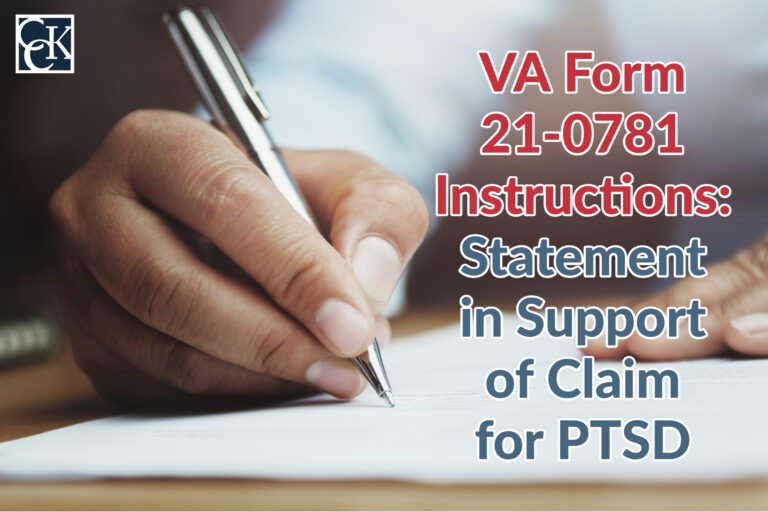VA Form 21-0781 Instructions: Statement in Support of Claim for PTSD

CCK Law: Our Vital Role in Veterans Law
What Is VA Form 21-0781?
VA Form 21-0781, Statement in Support of Claimed Mental Health Disorder(s) Due to an In-Service Traumatic Event(s), is used by Veterans Affairs (VA) to identify and gather records and evidence related to a VA disability claim or appeal for post-traumatic stress disorder (PTSD).
Specifically, VA asks for basic information about the traumatic incident or incidents (i.e., stressors) that led or contributed to a veteran’s PTSD diagnosis, so that VA knows which records to add to the veteran’s claim file. Examples of requested information include the approximate date and geographic location, the types of behavior changes experienced in the aftermath, and any care that might have been received.
The form is optional, and not all sections need to be completed. VA uses any details that are provided to identify records and evidence that could support your claim.
VA Form 21-0781 Instructions
VA Form 21-0781 can be filed online or printed out and submitted via mail or in-person at a local VA Regional Office.
The form contains ten sections.
Section I: Veteran’s Identification Information
In Section I, you list your identifying information, such as your name, social security number, VA file number, date of birth, service number, telephone number, or email address.
Section II: Traumatic Event(s) Information
In Section II, VA asks that veterans list basic details about their in-service traumatic event(s). The document provides space to write about six specific “stressors.” If more space is needed, you can continue in Section V, “Remarks.”
It is not necessary to provide extensive detail in this section. For example, unlike previous versions of the form, it is not necessary to include the names of anyone else involved, and no one who is named will be contacted by VA. The information is simply used to identify records related to the claim. If you desire to add more extensive comments to the form, see Section 5 (“Remarks”) (and note that you can also provide lay statements as part of your claim).
It is also allowed to use only approximate dates or locations if you are unable to find the exact information. VA will still attempt to identify any applicable records and use them to support your claim if arguably beneficial to you. This is referred to as the benefit of doubt doctrine.

Section III: Additional Information Associated with the In-Service Event(s)
This section asks primarily about behavioral changes, reports, and other records that might be relevant. It is not necessary to prove here that these are actually related to your PTSD. This information is used to identify and gather records that should be included in your claim file.
Section IV: Treatment Information
Similarly, this section asks if the veteran is aware of any official treatment records might be relevant, so that VA can either gather them or request consent to do so (in the case of private providers).
Section V: Remarks
The Remarks section is intended to be used to add to a previous answer.
If you would like to provide a personal statement from yourself or another observer about the traumatic events or their impact on your life, consider adding a lay statement to your claim.
Section VI: Consent to Notify the Veterans Health Administration (VHA)
This section allows veterans to consent to VA sharing the information gathered with VHA, for the purposes of facilitating VA health care.
At the time of this writing, this section only applies when the traumatic event(s) involve military sexual trauma (MST).
Sections VII-X: Certification and Signatures
The final sections are for certifying and signing the form.
Need Assistance with Your PTSD Claim or Appeal?
Did VA deny your claim for PTSD disability benefits? If so, Chisholm Chisholm & Kilpatrick may be able to help. CCK Law has represented tens of thousands of veterans before Veterans Affairs and the U.S. Court of Appeals for Veterans Claims, and we have argued many of the most precedent-setting cases in veterans law. With more VA-accredited representatives than any other law firm, we have the access to VA systems and the resources to help you secure the PTSD benefits that our country has promised you.
Reach out to CCK Law today at 800-544-9144 to request a free case evaluation.
About the Author
Share this Post
